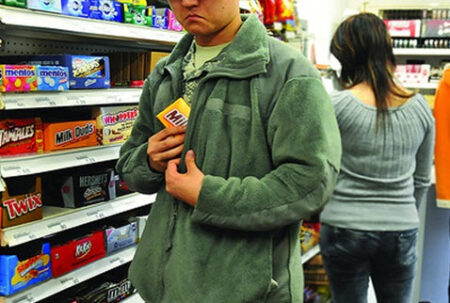Juvenile violations can have a serious impact on your future. We handle juvenile cases on a regular basis, and some violations are more likely than others. Here are the most common violations committed under the age of eighteen.
Most Common Juvenile Violations
Theft
Theft is a common juvenile crime. Shoplifting is a common occurrence among teens, but this also includes bicycle theft and thefts at school, like stealing from a fellow student’s backpack or locker. In order for the act to actually be considered theft, the person taking the item must intend to permanently deprive the victim of their property. Borrowing is not considered theft. However, if the theft is temporary and the plan is to collect payment or reward in exchange for the item, or if the item is being used in a way that would not allow the owner to use it again, the term theft still applies. Generally, the seriousness of the crime depends on the value of the object.

Vandalism
This is the second most common juvenile crime, but the difference is pretty significant. Vandalism accounts for a much lower percentage of juvenile crimes than theft, even though it is second in the lead. Vandalism includes anything from tagging to the destruction of property. It is essentially used to describe any time that someone causes harm or damages property that belongs to someone else. It is dealt with differently in the juvenile system than in adult courts, but can still be considered a serious crime.
Simple Assault
This terminology is typically used when the juvenile is fighting. If an individual causes harm to another, attempts to injure another party, or even threatens or puts another person in fear of harm, this charge is applied. Whether or not you actually have to have had physical contact with the victim in order to be charged is sometimes dependent on State law.
Underage Drinking or Minor in Possession
Alcohol use under the age of 21 is a common occurrence among teens and can have serious consequences. Unlike other age-restricted substances, such as tobacco, alcohol age restriction is a possession law. This means that a minor in possession of alcohol can also be charged with a crime. Those who use false identification for entry into a bar or to purchase alcohol can also be charged.
Similar laws are used to charge those who serve or provide alcohol to a minor.
Juvenile crimes may seem small, but they can have a serious impact if not defended properly.
Sources:

